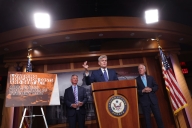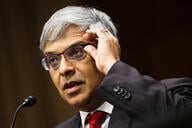You have /5 articles left.
Sign up for a free account or log in.
President Trump on Thursday repeated a campaign pledge by promising to "destroy" the Johnson Amendment, a 1954 federal provision that bans political activity by nonprofit organizations, including colleges and churches.
Under the amendment, nonprofit colleges cannot directly or indirectly endorse specific candidates or otherwise engage in politicking without risking their nonprofit tax status. Jerry Falwell Jr., Liberty University's president and an early Trump supporter, has called for the amendment's repeal, arguing that it has been used by the U.S. Internal Revenue Service to target conservative and religious groups. “In recent years it’s been used as a club,” Falwell told Inside Higher Ed in July. “It would be best for all nonprofit organizations if it were repealed.”
The amendment has rarely if ever been enforced in higher education. Yet David Herzig, a professor at Valparaiso University's law school who specializes in tax law, said it poses a theoretical concern for colleges in a heated political environment. "The penalty is you lose your exemption," he said. "It's a stiff penalty."
Herzig said a university-hosted rally, for example, where faculty members and lawmakers endorsed a political position, could be viewed as a violation of the amendment. Trump could call on the IRS to investigate such an event, Herzig said. That possibility seems less far-fetched this week, as the president on Twitter threatened to yank federal funding for the University of California, Berkeley, after violent protests led to the university canceling an appearance by a Breitbart writer and provocateur. "I do see the concern for higher ed," said Herzig.
Ending the Johnson Amendment, however, probably would not lead to much political advocacy by public colleges, said Jim Newberry, a lawyer who heads the higher education practice at Steptoe & Johnson. That's because public institution leaders tend to avoid confrontations with lawmakers who have a say in their funding. "You live by that sword, you die by that sword," he said.
Yet some religiously affiliated colleges might want to get more politically involved if the amendment was dropped, Newberry said. One reason, according to an article The Atlantic published this week, is that some religious colleges increasingly see a marketing value in appealing to political conservatives. Even so, Newberry doubted many colleges would operate all that differently if the ban on politicking were eliminated. "I just don't think it's really in the heart and soul of what they do," he said.




